外研(新标准)版七年级下Module 4 Life in the future Unit 3 Language in use课件(19张ppt)
文档属性
| 名称 | 外研(新标准)版七年级下Module 4 Life in the future Unit 3 Language in use课件(19张ppt) | 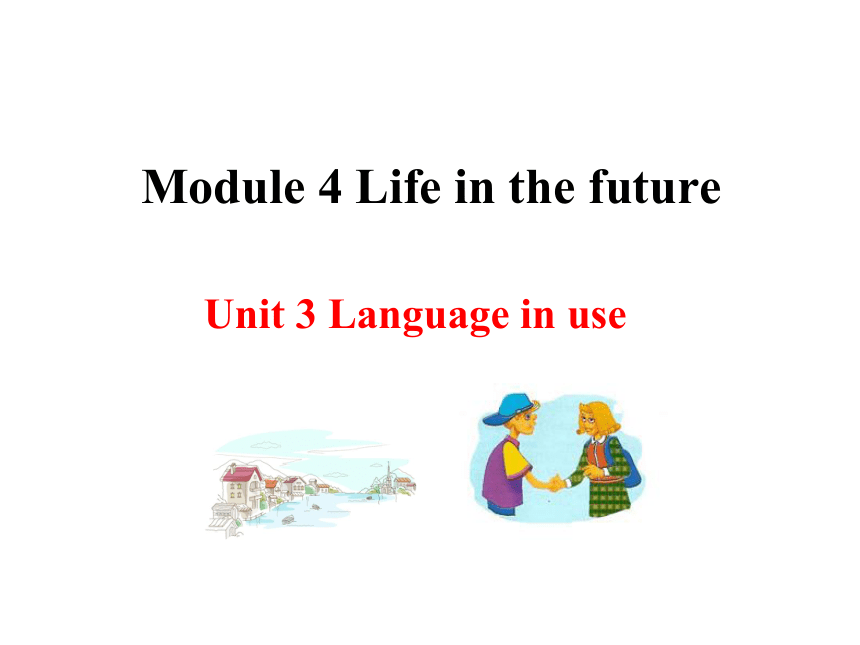 | |
| 格式 | pptx | ||
| 文件大小 | 498.5KB | ||
| 资源类型 | 教案 | ||
| 版本资源 | 外研版 | ||
| 科目 | 英语 | ||
| 更新时间 | 2022-03-21 16:32:08 | ||
图片预览


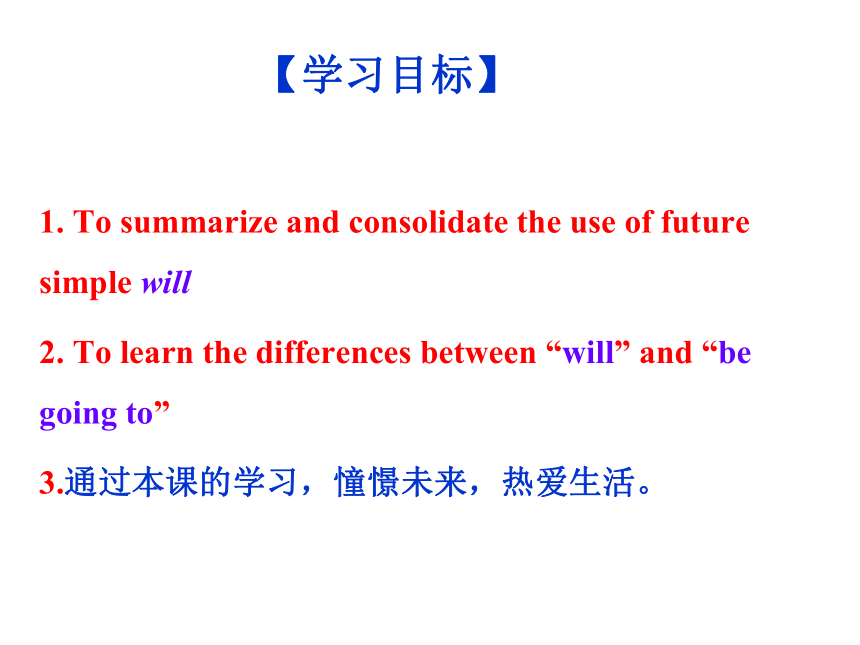
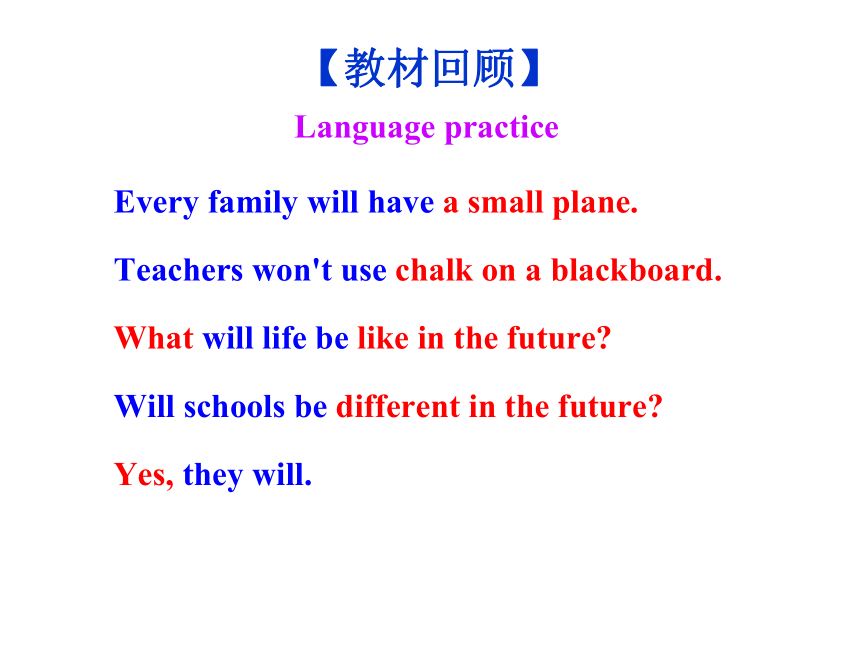
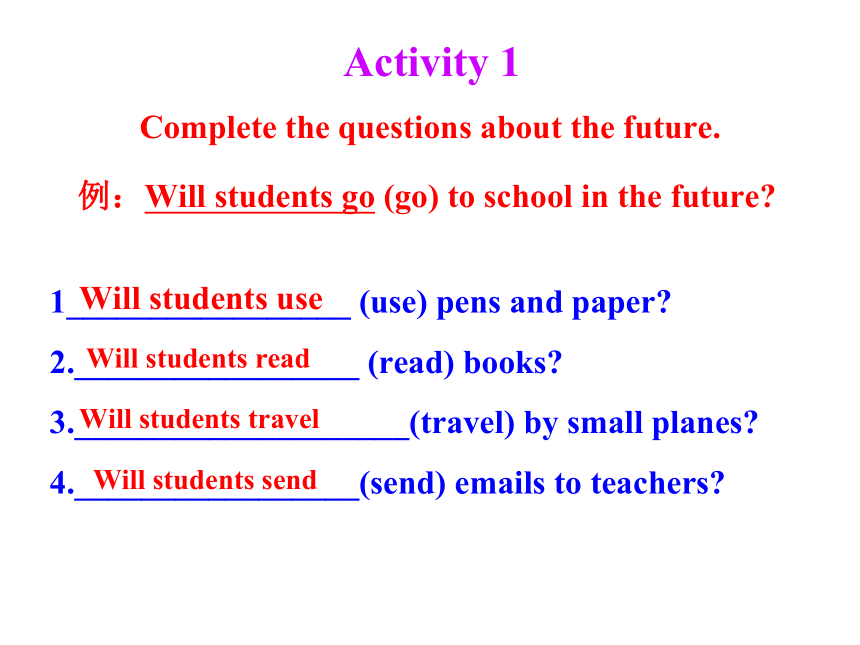
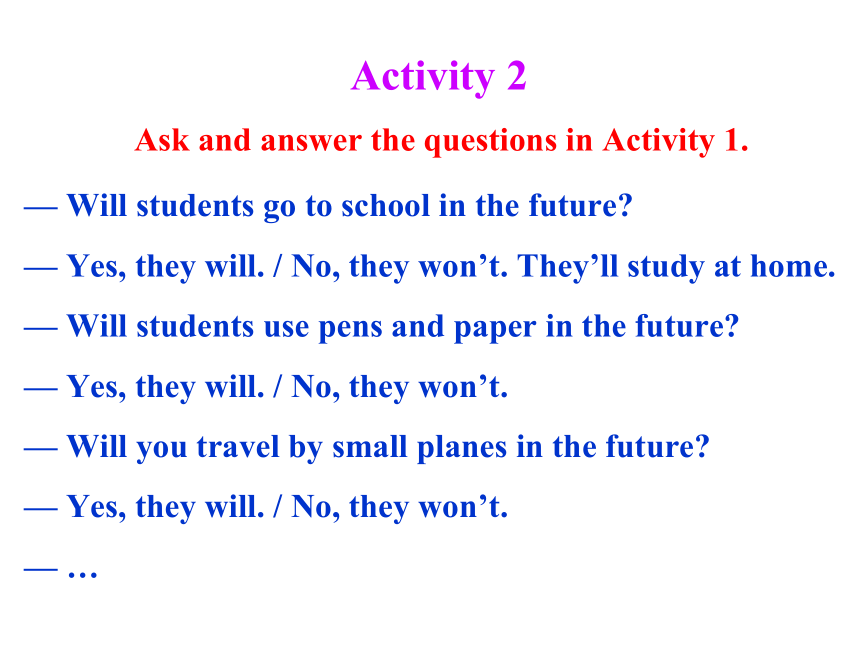
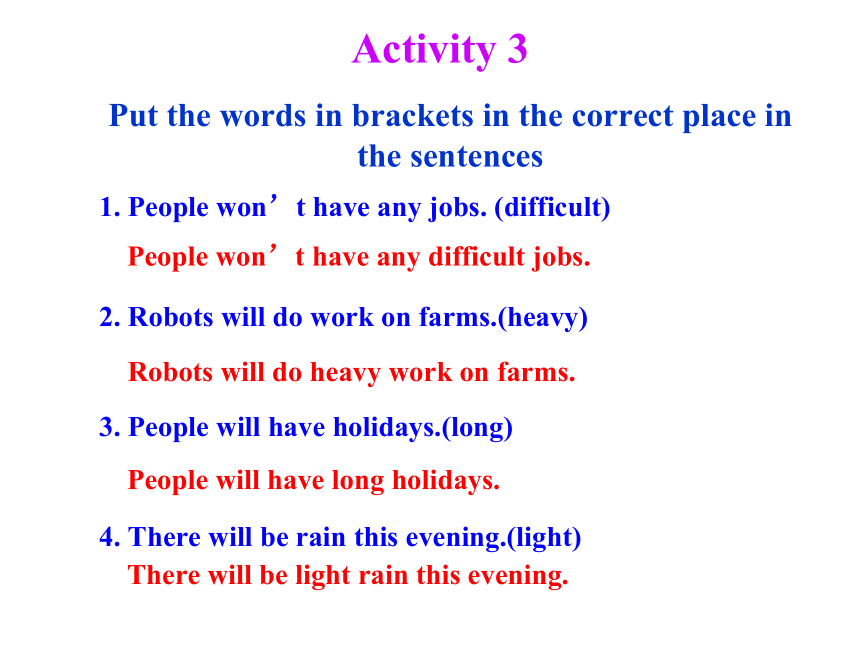
文档简介
(共19张PPT)
Unit 3 Language in use
Module 4 Life in the future
What will happen in the future Are you looking forward to the life in the future
1. To summarize and consolidate the use of future simple will
2. To learn the differences between “will” and “be going to”
3.通过本课的学习,憧憬未来,热爱生活。
【学习目标】
Language practice
Every family will have a small plane.
Teachers won't use chalk on a blackboard.
What will life be like in the future
Will schools be different in the future
Yes, they will.
【教材回顾】
1_________________ (use) pens and paper
2._________________ (read) books
3.____________________(travel) by small planes
4._________________(send) emails to teachers
Activity 1
Will students use
Will students read
Will students travel
Will students send
Complete the questions about the future.
例:Will students go (go) to school in the future
Ask and answer the questions in Activity 1.
— Will students go to school in the future
— Yes, they will. / No, they won’t. They’ll study at home.
— Will students use pens and paper in the future
— Yes, they will. / No, they won’t.
— Will you travel by small planes in the future
— Yes, they will. / No, they won’t.
— …
Activity 2
1. People won’t have any jobs. (difficult)
2. Robots will do work on farms.(heavy)
3. People will have holidays.(long)
4. There will be rain this evening.(light)
Activity 3
People won’t have any difficult jobs.
Robots will do heavy work on farms.
People will have long holidays.
There will be light rain this evening.
Put the words in brackets in the correct place in the sentences
Put the words and expressions from the box into the correct column .
email heavy rain heavy work hot summer interesting job Internet small plane traffic jam warm winter wind
Weather
Computer
Jobs
Travel
heavy rain hot summer warm
winter wind
email Internet
heavy work interesting job
small plane traffic jam
Activity 4
一般将来时表示将来某一时刻的动作或状态,或将来某一段时间内经常的动作或状态,常用“will+动词原形”来表示。 “will+动词原形”用来描述未来的事情或表达对未来的预测。will本身没有人称和数的变化
There will be a computer on every desk in the future.
将来每个桌子上都会有一台电脑。
一般将来时“will”
【探究导学】
Students will study on the Internet. They won’t use books.
学生将在网上学习,他们将不使用书了。
The teachers won’t write on the blackboard with chalk.
老师不会用粉笔在黑板上写字了。
表达“将来不会……”要用否定形式,在will后直接加not,构成will not,或缩略成won’t。
一般疑问句的结构是: will提到句首。(some改为any, and改为or, 第一二人称互换)
Students will go to school in the future. (变为一般疑问句)
→Will students go to school in the future
I will buy some bread this afternoon. (变为一般疑问句)
→Will you buy any bread this afternoon
肯定 否定 一般疑问 回答
I will… I will not/won’t … Will I … Yes, I will./ No, I won’t.
You will… You will not/won’t … Will you … Yes, you will./ No, you won’t.
He/she will… He/She will not/won’t … Will he/ she … Yes, he/she will./ No, he/she won’t.
will各句式总结
肯定 否定 一般疑问 回答
It will… It will not/won’t… Will it … Yes, it will./ No, it won’t.
We will… We will not/won’t… Will we … Yes, we will./
No, we won’t.
They will… They will not/won’t… Will they … Yes, they will./
No, they won’t.
There will be… There will not/won’t be… Will there be… Yes, there will./No, there won’t.
He is going to write a letter tonight.
He will write a book one day.
1. be going to 表示近期、眼下就要发生的事情; will 表示的将来时间则较远一些。
2. be going to 表示根据主观判断将来肯定发生的事, will表示客观上将来势必发生的事。
He is outstanding. He is going to succeed.
He will be twenty years old.
be going to 和will的区别
She is going to lend us her books.
He will be here in half an hour.
3. be going to 含有“计划, 准备”的意思, 而 will 则没有这个意思。
4. 在有条件从句的主句中, 一般不用 be going to, 而多用will/shall进行预测。 (即如果一事发生,另一事也就发生)
If the telephone rings, I will answer it.
come, go, leave, arrive, start 等动词也可用现在进行时表示一般将来时。
He is coming here next Sunday.
下周日他将来这儿。
When are you leaving
你什么时候动身?
现在进行时表示一般将来时
Module 4 Life in the future
【课堂小结】
Every family will have a small plane.
Teachers won't use chalk on a blackboard.
What will life be like in the future
Will schools be different in the future
Yes, they will.
根据汉语意思完成句子
1.将来每个人都将使用电脑。
Everyone ______ ______ computers in the future.
2.我们将会在家里学习。We ______ ______ at home.
3. 学生们将不再使用书了。
Students ______ _______ books any more.
4. 老师们将不再用粉笔在黑板上写字。
Teachers ______ _______ ______ to write on the blackboard.
will
use
will
study
won’t
use
won’t
use
chalk
【随堂训练】
5. ——将来每个人都有一台电脑在书桌上吗?
——是的。
— _____ everyone ____ a computer on their desks
— Yes, they _______ .
6. ——将来会有学校吗? ——没有。
— ______ there _______ schools in the future
— No, there ________ .
Will
have
will
Will
be
won’t
Unit 3 Language in use
Module 4 Life in the future
What will happen in the future Are you looking forward to the life in the future
1. To summarize and consolidate the use of future simple will
2. To learn the differences between “will” and “be going to”
3.通过本课的学习,憧憬未来,热爱生活。
【学习目标】
Language practice
Every family will have a small plane.
Teachers won't use chalk on a blackboard.
What will life be like in the future
Will schools be different in the future
Yes, they will.
【教材回顾】
1_________________ (use) pens and paper
2._________________ (read) books
3.____________________(travel) by small planes
4._________________(send) emails to teachers
Activity 1
Will students use
Will students read
Will students travel
Will students send
Complete the questions about the future.
例:Will students go (go) to school in the future
Ask and answer the questions in Activity 1.
— Will students go to school in the future
— Yes, they will. / No, they won’t. They’ll study at home.
— Will students use pens and paper in the future
— Yes, they will. / No, they won’t.
— Will you travel by small planes in the future
— Yes, they will. / No, they won’t.
— …
Activity 2
1. People won’t have any jobs. (difficult)
2. Robots will do work on farms.(heavy)
3. People will have holidays.(long)
4. There will be rain this evening.(light)
Activity 3
People won’t have any difficult jobs.
Robots will do heavy work on farms.
People will have long holidays.
There will be light rain this evening.
Put the words in brackets in the correct place in the sentences
Put the words and expressions from the box into the correct column .
email heavy rain heavy work hot summer interesting job Internet small plane traffic jam warm winter wind
Weather
Computer
Jobs
Travel
heavy rain hot summer warm
winter wind
email Internet
heavy work interesting job
small plane traffic jam
Activity 4
一般将来时表示将来某一时刻的动作或状态,或将来某一段时间内经常的动作或状态,常用“will+动词原形”来表示。 “will+动词原形”用来描述未来的事情或表达对未来的预测。will本身没有人称和数的变化
There will be a computer on every desk in the future.
将来每个桌子上都会有一台电脑。
一般将来时“will”
【探究导学】
Students will study on the Internet. They won’t use books.
学生将在网上学习,他们将不使用书了。
The teachers won’t write on the blackboard with chalk.
老师不会用粉笔在黑板上写字了。
表达“将来不会……”要用否定形式,在will后直接加not,构成will not,或缩略成won’t。
一般疑问句的结构是: will提到句首。(some改为any, and改为or, 第一二人称互换)
Students will go to school in the future. (变为一般疑问句)
→Will students go to school in the future
I will buy some bread this afternoon. (变为一般疑问句)
→Will you buy any bread this afternoon
肯定 否定 一般疑问 回答
I will… I will not/won’t … Will I … Yes, I will./ No, I won’t.
You will… You will not/won’t … Will you … Yes, you will./ No, you won’t.
He/she will… He/She will not/won’t … Will he/ she … Yes, he/she will./ No, he/she won’t.
will各句式总结
肯定 否定 一般疑问 回答
It will… It will not/won’t… Will it … Yes, it will./ No, it won’t.
We will… We will not/won’t… Will we … Yes, we will./
No, we won’t.
They will… They will not/won’t… Will they … Yes, they will./
No, they won’t.
There will be… There will not/won’t be… Will there be… Yes, there will./No, there won’t.
He is going to write a letter tonight.
He will write a book one day.
1. be going to 表示近期、眼下就要发生的事情; will 表示的将来时间则较远一些。
2. be going to 表示根据主观判断将来肯定发生的事, will表示客观上将来势必发生的事。
He is outstanding. He is going to succeed.
He will be twenty years old.
be going to 和will的区别
She is going to lend us her books.
He will be here in half an hour.
3. be going to 含有“计划, 准备”的意思, 而 will 则没有这个意思。
4. 在有条件从句的主句中, 一般不用 be going to, 而多用will/shall进行预测。 (即如果一事发生,另一事也就发生)
If the telephone rings, I will answer it.
come, go, leave, arrive, start 等动词也可用现在进行时表示一般将来时。
He is coming here next Sunday.
下周日他将来这儿。
When are you leaving
你什么时候动身?
现在进行时表示一般将来时
Module 4 Life in the future
【课堂小结】
Every family will have a small plane.
Teachers won't use chalk on a blackboard.
What will life be like in the future
Will schools be different in the future
Yes, they will.
根据汉语意思完成句子
1.将来每个人都将使用电脑。
Everyone ______ ______ computers in the future.
2.我们将会在家里学习。We ______ ______ at home.
3. 学生们将不再使用书了。
Students ______ _______ books any more.
4. 老师们将不再用粉笔在黑板上写字。
Teachers ______ _______ ______ to write on the blackboard.
will
use
will
study
won’t
use
won’t
use
chalk
【随堂训练】
5. ——将来每个人都有一台电脑在书桌上吗?
——是的。
— _____ everyone ____ a computer on their desks
— Yes, they _______ .
6. ——将来会有学校吗? ——没有。
— ______ there _______ schools in the future
— No, there ________ .
Will
have
will
Will
be
won’t
同课章节目录
- Module 1 Lost and found
- Unit 1 Whose bag is this?
- Unit 2 Are they yours?
- Unit 3 Language in use
- Module 2 What can you do ?
- Unit 1 I can play the piano
- Unit 2 I can run really fast
- Unit 3 Language in use
- Module 3 Making plans
- Unit 1 What are you going to do at the weekends?
- Unit 2 We're going to cheer the players.
- Unit 3 Language in use
- Module 4 Life in the future
- Unit 1 Everyone will study at home
- Unit 2 Every family will have a small plane.
- Unit 3 Language in use
- Module 5 Shopping
- Unit 1 What can I do for you?
- Unit 2 You can buy everything on the Internet
- Unit 3 Language in use
- Module 6 Around town
- Unit 1 Could you tell me how to get to the Nationa
- Unit 2 The London Eye is on your right.
- Unit 3 Language in use
- Revision module A
- Module 7 My past life
- Unit 1 I was born in a small village.
- Unit 2 I was born in Quincy.
- Unit 3 Language in use
- Module 8 Story time
- Unit 1 Once upon a time….
- Unit 2 Goldilocks hurried out of the house.
- Unit 3 Language in use
- Module 9 Life history
- Unit 1 He left school and began work at the age of
- Unit 2 He decided to be an actor.
- Unit 3 Language in use
- Module 10 A holiday journey
- Unit 1 What did you do?
- Unit 2 This morning we took a walk.
- Unit 3 Language in use
- Module 11 Body language
- Unit 1 They touch noses!
- Unit 2 Here are some ways to welcome them.
- Unit 3 Language in use
- Module 12 Western music
- Unit 1 It's so beautiful!
- Unit 2 Vienna is the centre of European classical
- Unit 3 Language in use
- Revision module B
